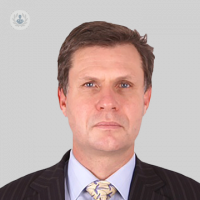Standing up to PoTS: What is postural tachycardia syndrome?
Written in association with:People with postural tachycardia syndrome (PoTS), caused by the autonomic nervous system, will see their heart rate affected after standing or sitting up.
Here, Dr Edward Petzer, an esteemed consultant cardiologist, provides an expert insight into this disorder, explaining what are the symptoms and how serious PoTS can become.

What is PoTS and what exactly causes it?
Postural orthostatic tachycardia syndrome is when a patient’s heart rate generally rises above what it should be for a certain activity, but more importantly, it is associated with debilitating symptoms which are normally light-headedness, breathlessness and general unwellness. It can also be associated with brain fog, another non-specific finding as well, in which people have problems maintaining brain function. Men can be affected, but women unfortunately carry the brunt of PoTS.
Is PoTS chronic or is there a cure or effective treatment option?
PoTS generally is a chronic condition. Around 80 per cent of PoTS cases are related to hypermobility, where the individual is obviously born with hypermobility, normally Ehlers-Danlos syndrome type 3. This means that their vascular system stretches more easily. With this stretching effect on the vascular system, blood pressure drops and reflex tachycardia can occur. Thus, most PoTS cases are chronic.
However, post-inflammatory PoTS is a subgroup - which used to be quite a small group (maybe 15 to 20 per cent of all cases) - in which a patient with severe pneumonia or a severe viral infection will get a post-inflammatory type PoTS response. Post-COVID, we have seen a massive increase in these PoTS-type symptoms, which are often occurring in acute, viral infections such as COVID-19.
This is more of an acute illness, but acute illness has a risk of ultimately leading to a more chronic illness. A large percentage of patients do seem to get better.
Is PoTS hereditary?
Ehlers-Danlos syndrome could be argued to be hereditary, as hypermobility can run through in families. For example, some siblings may have it and other siblings may not.
PoTS is a syndrome, but the underlying mechanism - which is the hypermobility issue – is or can be hereditary. As a result, there can be hereditary components to PoTS, but PoTS is not, in the classic sense, hereditary.
How will people know they have PoTS?
PoTS is a syndrome, not a disease and many patients can live undiagnosed for up to years with non-specific symptoms until they eventually see a clinician who suspects PoTS.
A lot of peripheral illnesses also feed into PoTS, and some patients of PoTS will primarily experience more gastric issues, and some will have difficulties swallowing. The autonomic system also affects the bladder, so some patients can present with urinary frequency.
The presentation of PoTS can be multifactorial and multi-varied with symptoms spread across different spectrums, making it more difficult for doctors to make a diagnosis.
If left untreated, can PoTS be potentially fatal?
PoTS is not fatal, but patients will experience serious and painful difficulties in their daily life, and that is the truth. Patients do not usually die from PoTS; it is not a disorder that people die from per say, but the quality of life on a severe PoTS patient is one of the worst I have seen of any illness I have ever treated, including advanced heart failure and chronic disease. The quality of life for a PoTS patient is the big issue, and this can often stop people completing university, maintaining a job and, with women, wanting to have children, because they are scared of managing the pregnancy and their child.
Despite this, most PoTS patients often just need a caring physician to let them know that a normal life is possible. I never promise PoTS patients that I will make them completely better because it is very difficult to achieve that. However, as a doctor, I can help patients to live their lives with some symptoms, but living their lives and achieving what they want to do, and I believe that is the key to managing PoTS patients.
If you are living with PoTS and wish to seek expert assessment and treatment, do not hesitate to visit Dr Edward Petzer’s Top Doctors profile today.



